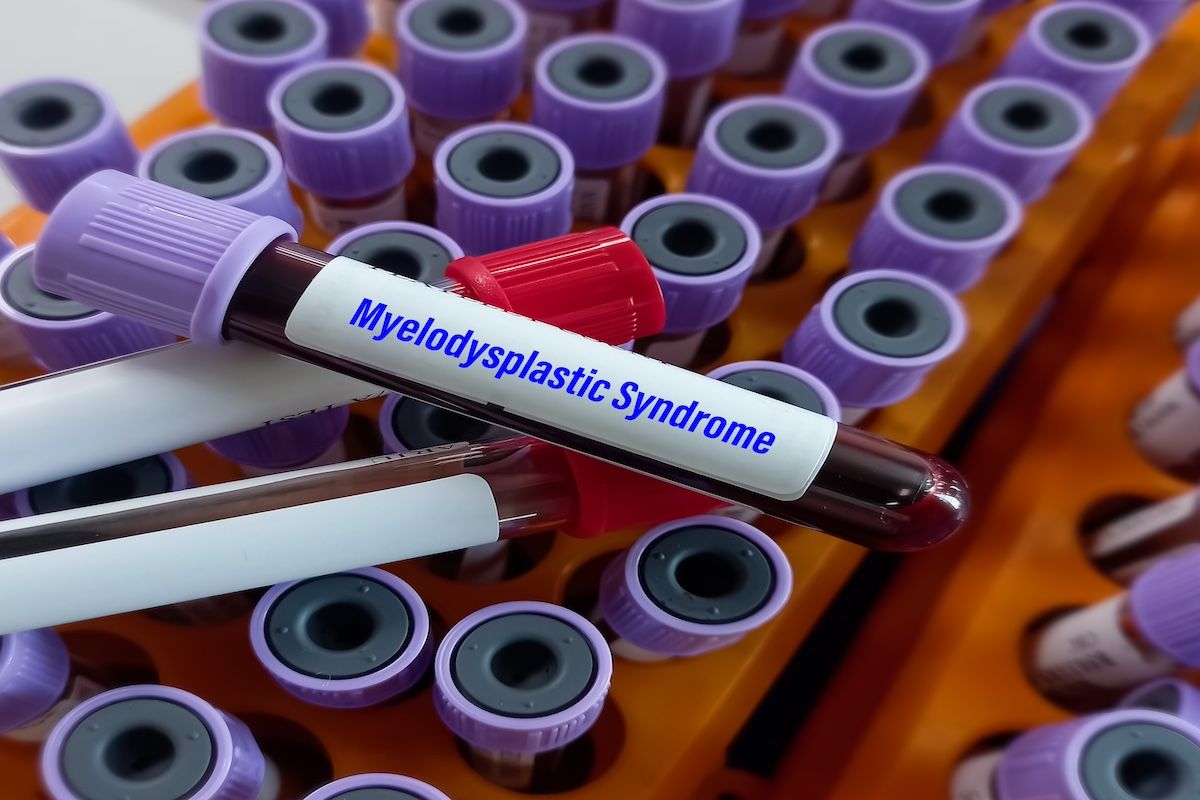- Center on Health Equity & Access
- Clinical
- Health Care Cost
- Health Care Delivery
- Insurance
- Policy
- Technology
- Value-Based Care
Targeted Treatment May Improve Outcomes in IDH1-Mutated MDS
A pair of abstracts presented at the 2024 American Society of Hematology (ASH) Annual Meeting & Exhibition suggest that IDH1-targeted treatment may improve survival among patients with myelodysplastic syndromes (MDS) with the mutation.
Data coming out of the 2024 American Society of Hematology (ASH) Annual Meeting & Exhibition suggest that targeting IDH1 mutations in myelodysplastic syndromes (MDS) can improve outcomes in patients with high-risk disease and may have a benefit in patients with low-risk disease. Data also suggest that IDH1 mutations are more common among patients with concurrent autoimmune disease.1,2
Researchers of one abstract retrospectively analyzed data from over 2000 patients with MDS—either high risk or low risk—and found that IDH1-targeted treatment may yield improved outcomes for both groups of patients, adding to previous research in the patient type showing comparable efficacy with hypomethylating agents (HMAs) and an efficacy edge with subsequent targeted treatment.
“For HR-MDS, response to HMA therapy is similar between IDH1-MT and WT pts,” explained the researchers.“Historically, the median OS for IDH1-MT MDS post-HMA failure without IDH1 inhibitor is poor (5.1 months). However, IDH1 inhibitors significantly improve survival in IDH1-MT pts in real world data (OS 28.6 months).”
Abstracts from the 2024 ASH Annual Meeting & Exhibition suggest that IDH1-targeted treatment may improve survival among patients with MDS with the mutation. | Image credit: MdBabul - stock.adobe.com

Among the 1000 patients with high-risk MDS, 32 (3%) had an IDH1 mutation, and among the 1300 patients with low-risk disease, 2.8% (n=37) had an IHD1 mutation. The prevalence of IDH1 mutations among these patients is in line with previous data, which has showed a 3.6% prevalence rate.3
Across patients with high-risk disease, median OS was significantly improved for the 4 patients who received an IDH1 inhibitor, either ivosidenib or olutasidenib, compared with the 28 patients who did not (28.6 months vs 5.1 months; P < .05).
All 32 patients first received frontline therapy with azacitidine (61.5%), decitabine (14.4%), oral decitabine (1.5%), HMA with venetoclax (11.1%), or other HMA combinations (11.5%). There were no significant differences in response rates to HMA treatment.
In the group of patients with low-risk disease, those with an IDH1 mutation were more likely to have their MDS transform into acute myeloid leukemia (AML), leading the researchers to suggest that targeting IDH1 among this risk group may have benefits, as well. While AML transformation was different between the two groups of patients, there was no significant difference observed in median OS between patients with and without an IDH1 mutation (92 vs 70 months; P = .25). Leukemia-free survival was not reached for wild-type patients and was 92 months for patients with an IDH1 mutation (P = .006).
As these researchers assessed outcomes in patients with IDH1 outcomes, another group of researchers published data on IDH1 mutation prevalence as an abstract at ASH. This group of researchers, collecting data amongst over 2500 patients with MDS, confirmed previous reports that patients with myeloid neoplasm and concomitant autoimmune rheumatic disease (AIRD) are more likely to harbor IDH1 mutations.2
“We previously reported that autoimmune diseases (AID) are commonly observed in MDS patients (pts) (28%) including autoimmune rheumatic diseases (AIRD),” described the researchers.“There is increase recognition of the association of certain acquired somatic mutations and inflammation.”
Overall, the researchers reviewed data from 79 patients with concomitant AIRD and 2400 without. Among all mutations assessed, only IDH1 somatic mutations were enriched among patients with both diseases. The prevalence of IDH-1 was more than 3 times higher among patients with MDS and AIRD than among patients with just MDS (11% vs 3%; P < .0005). IDH1 was more common amongst both men (15% vs 3%) and women (8% vs 3%) with both diseases compared with their MDS-only counterparts (P < .0005).
The researchers found no differences in median overall survival (OS) between patients with AIRD-MDS and patients with just MDS, though they did observe a non-statistically significant trend of inferior median OS among patients with ARD-MDS with an IHD1 mutation (30 months vs 40 months).
References
- Abuhelwa Z, Ali NHA, Xie Z, et al. The argument for targeted therapy in IDH1 mutated myelodysplastic syndromes (MDS): poor outcomes post-hypomethylating agent failure in higher risk MDS and reduced leukemia free survival in lower risk MDS. Presented at: 66th ASH Annual Meeting & Exposition; December 7-10, 2024; San Diego, CA. Abstract 4589.
- Komrokji RS, Ali NHA, Xie Z, et al. IDH-1 somatic mutations are more commonly observed among patients with comcomitant myelodysplastic syndromes (MDS) and autoimmune rheumatoid diseases (AIRD). Presented at: 66th ASH Annual Meeting & Exposition; December 7-10, 2024; San Diego, CA. Abstract 3228.
- Thol F, Weissinger EM, Krauter J, et al. IDH1 mutations in patients with myelodysplastic syndromes are associated with an unfavorable prognosis. Haematologica. 2010;95(10):1668-1674.
The Importance of Examining and Preventing Atrial Fibrillation
August 29th 2023At this year’s American Society for Preventive Cardiology Congress on CVD Prevention, Emelia J. Benjamin, MD, ScM, delivered the Honorary Fellow Award Lecture, “The Imperative to Focus on the Prevention of Atrial Fibrillation,” as the recipient of this year’s Honorary Fellow of the American Society for Preventive Cardiology award.
Listen
Promoting Equity in Public Health: Policy, Investment, and Community Engagement Solutions
June 28th 2022On this episode of Managed Care Cast, we speak with Georges C. Benjamin, MD, executive director of the American Public Health Association, on the core takeaways of his keynote session at AHIP 2022 on public health policy and other solutions to promote equitable health and well-being.
Listen
